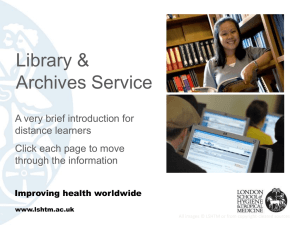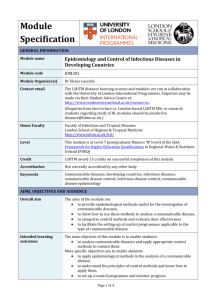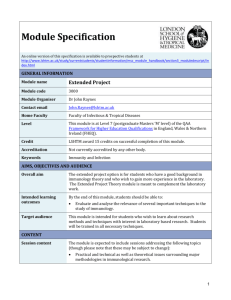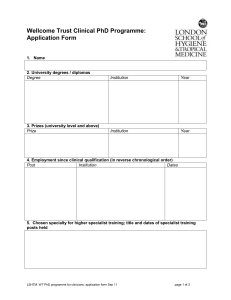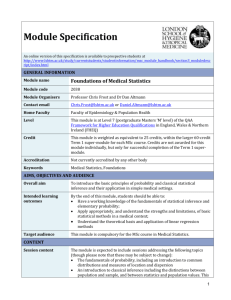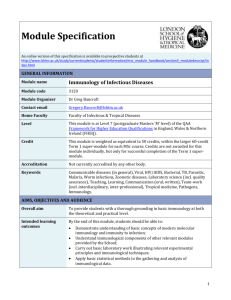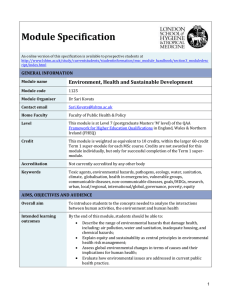PHM202 Communicable Disease Control
advertisement
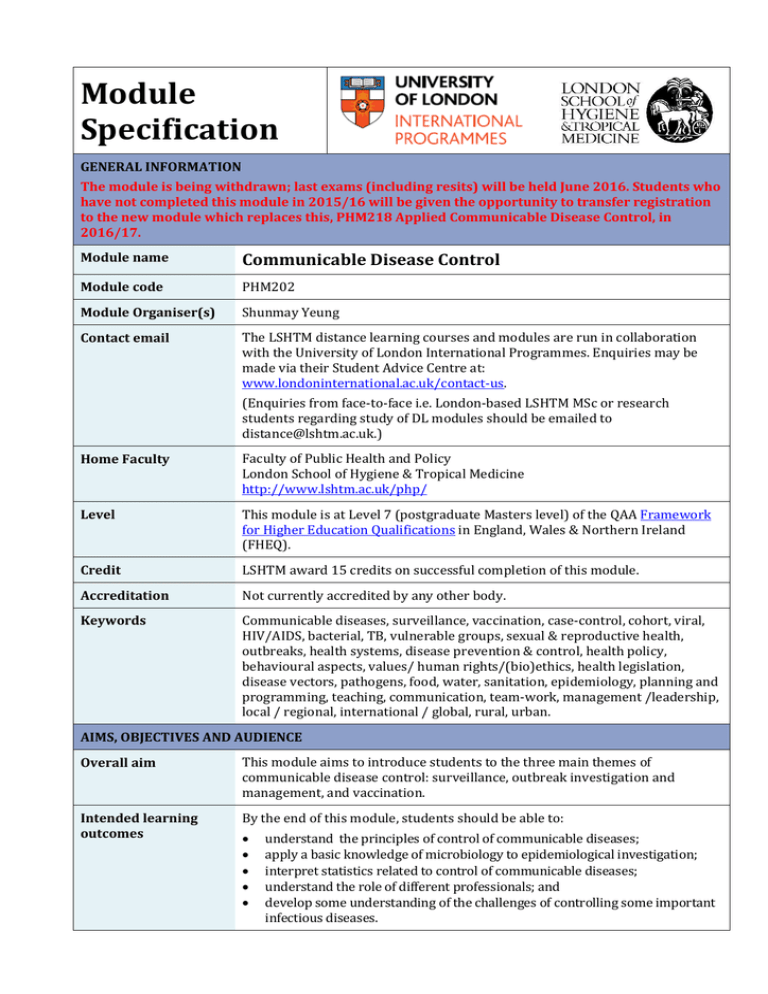
Module Specification GENERAL INFORMATION The module is being withdrawn; last exams (including resits) will be held June 2016. Students who have not completed this module in 2015/16 will be given the opportunity to transfer registration to the new module which replaces this, PHM218 Applied Communicable Disease Control, in 2016/17. Module name Communicable Disease Control Module code PHM202 Module Organiser(s) Shunmay Yeung Contact email The LSHTM distance learning courses and modules are run in collaboration with the University of London International Programmes. Enquiries may be made via their Student Advice Centre at: www.londoninternational.ac.uk/contact-us. (Enquiries from face-to-face i.e. London-based LSHTM MSc or research students regarding study of DL modules should be emailed to distance@lshtm.ac.uk.) Home Faculty Faculty of Public Health and Policy London School of Hygiene & Tropical Medicine http://www.lshtm.ac.uk/php/ Level This module is at Level 7 (postgraduate Masters level) of the QAA Framework for Higher Education Qualifications in England, Wales & Northern Ireland (FHEQ). Credit LSHTM award 15 credits on successful completion of this module. Accreditation Not currently accredited by any other body. Keywords Communicable diseases, surveillance, vaccination, case-control, cohort, viral, HIV/AIDS, bacterial, TB, vulnerable groups, sexual & reproductive health, outbreaks, health systems, disease prevention & control, health policy, behavioural aspects, values/ human rights/(bio)ethics, health legislation, disease vectors, pathogens, food, water, sanitation, epidemiology, planning and programming, teaching, communication, team-work, management /leadership, local / regional, international / global, rural, urban. AIMS, OBJECTIVES AND AUDIENCE Overall aim This module aims to introduce students to the three main themes of communicable disease control: surveillance, outbreak investigation and management, and vaccination. Intended learning outcomes By the end of this module, students should be able to: understand the principles of control of communicable diseases; apply a basic knowledge of microbiology to epidemiological investigation; interpret statistics related to control of communicable diseases; understand the role of different professionals; and develop some understanding of the challenges of controlling some important infectious diseases. Target audience This module is open to students who registered for the MSc Clinical Trials, Epidemiology, Global Health Policy and Public Health courses with effect from 1 September 2012 or earlier. Note: The module is being withdrawn and is expected to be replaced with an updated version (PHM218 Applied Communicable Disease Control) available from October 2016. 2015/16 will be the last year that students can register for this module. The last examination (including resit) for this module will be held in June 2016. Students who either fail the module at first attempt or do not submit their assignment and/or sit the exam in June 2016 will be given the option of transferring module registration to the new updated module – PHM218 Applied Communicable Disease – at no additional cost. This module is recommended for students studying the Environment and Health, Health Promotion, and General streams of the DL MSc Public Health course. CONTENT Session content This module explores the basics of control, namely surveillance, outbreak investigation and management, and vaccination. The module also illustrates these areas through an examination of some important diseases. The module begins by outlining the general principles of surveillance and addresses practical aspects of surveillance implementation. International surveillance is considered and examples of surveillance in practice illustrate the challenges and approaches to surveillance. Outbreaks of communicable diseases are considered next. Specifically, epidemiological approaches to investigation of outbreaks, the critically important elements to outbreak management, and analytical approaches to outbreak control. In addition to the textbook, compulsory and optional readings provide deeper considerations. Vaccines are an important tool in the public health armamentarium of disease control. The module explores several areas related to their use including their evaluation, delivery programmes, efficacy and effectiveness, surveillance or vaccine programmes and the role of the media. This module concludes by reflecting on a number of topical themes, some of which are disease specific (for example, influenza, tuberculosis, HIV) and some of which are broader (for example, food poisoning). Wider reading of optional papers aims to expand students’ experience to further topical issues and challenges. Click on the link below to view the content of the module textbook: http://www.amazon.co.uk/Controlling-Communicable-DiseaseUnderstanding-Public/dp/033521844X TEACHING, LEARNING AND ASSESSMENT Study resources provided or required The following materials are provided to students after registration for this module once a year in September/October: A brief guide to studying the module. The main textbook: Controlling Communicable Disease by Norman Noah A reading list including details of both required and optional reading and links to selected papers. A list of useful websites. Access to the LSHTM Virtual Learning Environment (VLE) - Moodle, where students can access a range of materials, including some of the materials listed above; participate in module-specific discussion forums and Collaborate sessions and access the LSHTM online library resources. Please note the textbook will be sent to students. All other materials may be accessed via the LSHTM VLE – Moodle. Teaching and learning methods Learning is self-directed against a detailed set of learning objectives that are identified at the start of each chapter of the module textbook, Controlling Communicable Disease by Norman Noah. The module textbook also offers focused reading and various learning activities. Additional learning materials include: a brief guide to the module, recommended reading from the peer-reviewed literature, Frequently Asked Questions (FAQs) and suggested relevant websites. Student support is available from the module tutors through Moodle, the webbased discussion forum. Students are strongly encouraged to use Moodle to obtain tutor support and participate in the module-specific discussions and real-time tutorials, and to make use of LSHTM online library resources. In addition, individual written feedback is provided on an assessed assignment submitted by the student. Assessment details Formal assessment of this module includes a two-hour 15 minute unseen written paper examination (70%) and an assessed assignment (30%) which is usually about 2500 words. Details of the maximum word limit permitted and what to include in the word count are provided in the assignment instructions document. Students are required to keep within the word limit detailed in the Assignment Instructions. If students fail the module overall, they are allowed one further attempt at the failed element (examination and/or assignment). Assessment dates Assignments for this module can be submitted only once annually, no later than 31 March and must be submitted via the online Assignment Management System. Unseen written examinations for DL modules are held once a year, in June (including re-sits). Examinations are normally taken in a student’s country of residence, in one of over 650 examination centres worldwide (arranged mainly through Ministries of Education or the British Council). A list of examination centres can be found at www.londoninternational.ac.uk/community-supportresources/current-students/examinations/examination-centres. A local fee will be payable direct to the examination centre. This fee is in addition to the course/module fee and is set by, and paid directly to, the individual examination centres. The level of local examination centre fees varies across the world and neither the University of London International Programmes nor the LSHTM have any control over the fee amount. Language of study and assessment English (please see ‘English language requirements’ below regarding the standard required for entry). TIMING AND MODE OF STUDY Duration Distance learning module studies begin in early October. The textbook that supports the module will be dispatched to registered students in early autumn once fees have been paid. All other module materials will be made available on Moodle. Students may start their studies at any time from October 1st onwards and work through the material until the start of the June examinations (although assessment submission deadlines which are earlier than this must be observed). Dates Tutorial support for distance learning modules is available only from the beginning of October through to the end of May. Mode of study By distance learning. Learning time The notional learning time for the module totals 150 hours, consisting of: Directed self-study (reading and working through the provided module material) and self-directed learning (general reading around the subject, library, Moodle discussion forums) ≈ 110 hours Assessment, review and revision ≈ 40 hours APPLICATION, ADMISSION AND FEES Pre-requisites Those wishing to study this module must have regular access to the internet and should register on the LSHTM Virtual Learning Environment (Moodle). The Module Organisers and tutors use Moodle as their primary means of communication with students and use it to make available a range of materials for studying the module. Students are also encouraged to participate in module-specific discussions on Moodle; make use of the online library facilities and will be required to submit assignments via an on-line assignment management system. English language requirements A strong command of the English language is necessary to benefit from studying the module. Applicants whose first language is not English or whose prior university studies have not been conducted wholly in English must fulfil LSHTM’s English language requirements, with an acceptable score in an approved test taken in the two years prior to entry. Applicants may be asked to take a test even if the standard conditions have been met. Student numbers There is no cap on the number of students who can register for this distance learning module. The number of students actively studying this module varies, but typically approximately 160 students register for the module per year. Student selection This module is currently available to students who registered for the MSc Clinical Trials, Epidemiology, Global Health, and Public Health courses effective from 1 September 2012. This module is not available to those who have already studied module IDM701 (ex-HS307) Introduction to Public Health and Control of Infectious Diseases. This module is also open to students registered on LSHTM face-to-face (i.e. London-based) MSc courses (subject to course-specific limitations) and research degree students. Fees The current schedule of fees can be viewed at www.londoninternational.ac.uk/fees (click on the LSHTM course link). Scholarships Scholarships are not available for individual modules. Some potential sources of funding are detailed on the LSHTM website. Admission deadlines Applications for LSHTM distance learning courses and modules are managed by the University of London International Programmes. To apply to take either a formal award (i.e. PG Certificate, PG Diploma or MSc) or an individual module, click the relevant link on the right hand side of the page at http://www.londoninternational.ac.uk/courses/postgraduate/lshtm/publichealth-msc-postgraduate-diploma-postgraduate-certificate Key deadlines are as follows: If taken as part of a formal award (i.e. PG Certificate, PG Diploma or MSc): Application deadline: 30 June each year Registration deadline 30 September each year (students are advised to register by mid September so that registration is finalised before the study year and Moodle access starts on 1 October) If taken as an individual module: Application deadline: 31 August each year Registration deadline: 30 November each year (In-house LSHTM MSc and research students wishing to study this module should note information given in the mixed mode study option links, for MSc students at http://www.lshtm.ac.uk/edu/taughtcourses/handbooks_regs_pols/msc_mixed modeinformation.pdf, and for DrPH/research degree students at http://intra.lshtm.ac.uk/edu/researchdegrees/rdsupportframework/profdev/ rd_mixedmodeinformation.pdf.) ABOUT THIS DOCUMENT This module specification applies for the academic year 2015-16 Note: this module is being withdrawn and replaced with PHM218 Applied Communicable Disease Control in October 2016. The final exams for this module, including resits, will take place in June 2016. Please see the section – Target Audience – for further details. Last revised/approved 3 June 2015 by Sue Horrill London School of Hygiene & Tropical Medicine, Keppel St., London WC1E 7HT. www.lshtm.ac.uk

